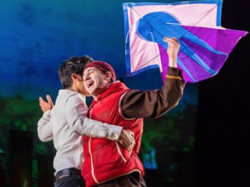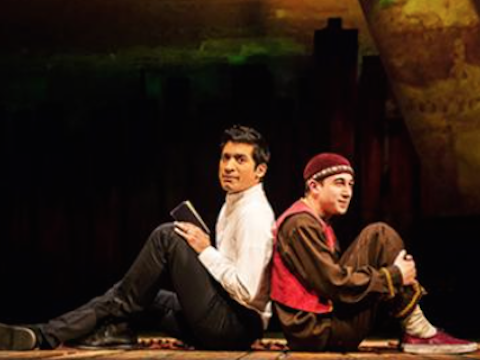 Abraham Lincoln
If given the truth, the people can be depended upon to meet any national crisis...
Abraham Lincoln
If given the truth, the people can be depended upon to meet any national crisis...
 Guildford news...
for Guildford people, brought to you by Guildford reporters - Guildford's own news service
Guildford news...
for Guildford people, brought to you by Guildford reporters - Guildford's own news service
Stage Dragon: The Kite Runner, Yvonne Arnaud Theatre
Published on: 18 Apr, 2018
Updated on: 18 Apr, 2018
By Alice Fowler
The Kite Runner, Khaled Hosseini’s masterful story of betrayal and redemption, begins in an Afghanistan hardly recognisable as the strife-torn country we know today.
It is the early Seventies, and two young boys, Amir (superbly played by Raj Ghatak) and Hassan (Jo Ben Ayed), form a deep friendship. Amir’s father, Baba, is a businessman and part of the ruling Pashtun class, while Hassan, Baba’s servant’s son, is a lowly Hazara. What matters more, to the boys at least, is that Hassan is the best kite runner in Kabul – the name given to boys who chase after fallen kites in the city’s great kite flying contests.
Menace soon arrives in the form of Assef (Soroosh Lavasini), a bully of the worst kind. He exploits the differences between the boys and subjects Hassan to a disturbing form of torture.
Much of the production’s dramatic power comes from Lavasini’s convincing malevolence. So arises the play’s central question: will Amir – a boy whom his father derides as weak – find the strength to stick up for his friend?
 Anyone familiar with Hosseini’s epic novel, which moves from Kabul to San Francisco, spanning decades and generations as it goes, will wonder how such a complex story could work on stage. In fact, thanks to an extremely talented cast, wonderful music and fast-paced direction, we find ourselves immersed in Amir and Hassan’s story.
Anyone familiar with Hosseini’s epic novel, which moves from Kabul to San Francisco, spanning decades and generations as it goes, will wonder how such a complex story could work on stage. In fact, thanks to an extremely talented cast, wonderful music and fast-paced direction, we find ourselves immersed in Amir and Hassan’s story.
Designer Barney George has created a simple but effective set, with two kite-shaped wings poised above the stage. Kites flutter on strings as the play’s kite-flying tournaments – both pivotal scenes – unfold.
Musician Hanif Khan is on stage throughout playing the traditional ‘tabla’ drums, whose rhythms underscore key moments in the drama. Large wooden rattles – schwirrbogen, to those in the know – are twirled by the cast, becoming the whispering wind on which the kites rise and fall.
Along the way there is plenty to learn about the history of Afghanistan and its people. As the monarchy falls and the country becomes a republic, Amir and his father flee to Pakistan and thence to San Francisco. There they must begin again, as immigrants, scraping a living in flea markets.
Amir’s relationship with his father changes too. Baba, wonderfully played by Gary Pillai, is an authoritarian figure, disappointed in his son. How much of Amir’s behaviour towards Hassan, we wonder, is driven by jealousy of his father’s affection for the young Hazari boy?
There are twists aplenty in the final scenes, as old scores are settled and long-buried secrets emerge. Seats are still available for this riveting production, presented by the Nottingham Playhouse and Liverpool Everyman & Playhouse, and on show at the Yvonne Arnaud until Saturday, April 21. This mesmerising drama will stay with you long after you have left the theatre.
Box office 01483 440000, www.yvonne-arnaud.co.uk
Recent Articles
- Letter: The National Trust Needs to Speed Up
- Highways Bulletin for January 13
- Letter: Anyone Who Thinks Local Government Reorganisation Will Save Money Is Deluded
- Letter: The National Trust Should Be Embarrassed About How Long the Weir Repair Is Taking
- Updated: City’s Match Postponed – Next Home Match February 1
- Letter: Shaping Guildford’s Future and Meeting the New Housing Uplift
- Mayor’s Diary: January 10 – 26
- County Council Elections ‘Must Go Ahead’ Say Surrey Council Leaders
- Notice: Become a Tech Angel
- Guildford’s Angels Receive National Lottery Grant


Search in Site
Media Gallery
Dragon Interview: Local Artist Leaves Her Mark At One of England’s Most Historic Buildings
January 21, 2023 / No Comment / Read MoreDragon Interview: Lib Dem Planning Chair: ‘Current Policy Doesn’t Work for Local People’
January 19, 2023 / No Comment / Read MoreA3 Tunnel in Guildford ‘Necessary’ for New Homes, Says Guildford’s MP
January 10, 2023 / No Comment / Read More‘Madness’ for London Road Scheme to Go Ahead Against ‘Huge Opposition’, Says SCC Leader
January 6, 2023 / No Comment / Read MoreCouncillor’s Son Starts Campaign for More Consultation on North Street Plan
December 30, 2022 / No Comment / Read MoreCounty Council Climbs Down Over London Road Works – Further ‘Engagement’ Period Announced
December 14, 2022 / No Comment / Read MoreDragon Interview: GBC Reaction to the Government’s Expected Decision to Relax Housing Targets
December 7, 2022 / No Comment / Read MoreHow Can Our Town Centre Businesses Recover? Watch the Shop Front Debate
May 18, 2020 / No Comment / Read More












Recent Comments